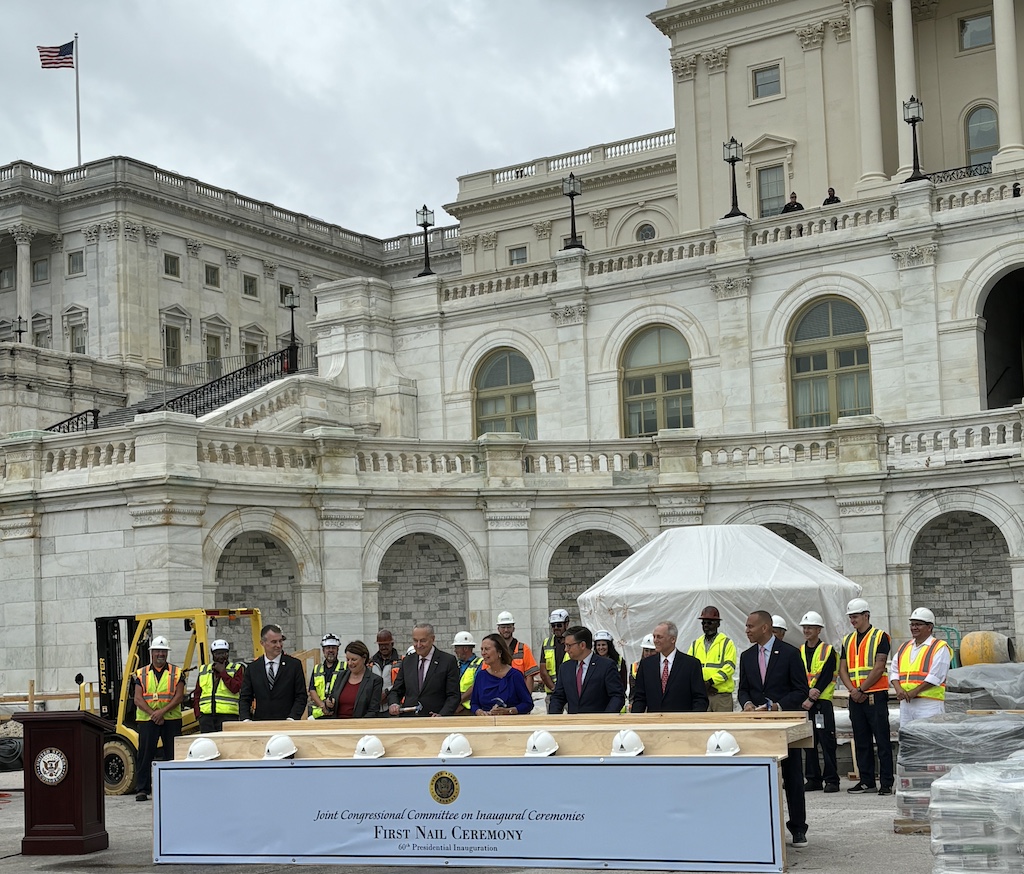WASHINGTON – The six members of the Joint Congressional Committee on Inaugural Ceremonies (JCCIC) on Wednesday struck the first nails into what will eventually be a structure on the west front of the United States Capitol that will hold nearly 1,600 people for the inauguration of the nation’s next president on Jan. 20.
“This platform will serve as a stage for a momentous occasion where we will celebrate our democracy and the sacred values that tie us together as a nation,” Sen. Amy Klobuchar, D-Minnesota, and a committee member, said. “It is here that we will pause to reaffirm that ours is, and always will be a government of, by and for the people. We will stand here united in support of the resilient democracy for generations to come.”
Moments later, the members of the bipartisan and bicameral committee bowed their heads, eyes shut, over a makeshift plywood work table on which the structure for the 60th inaugural ceremonies will be built.
United States Senate Chaplain Barry Black thanked workers involved in building the platform for the inauguration of the 47th president, more than a dozen of whom stood behind him in neon construction vests and hard hats, as he concluded the traditional “first nail” ceremony.
“Give the workers on this important project strength for the challenges and the satisfaction that in their work they are contributing to the price of freedom,” Black said.
Slightly more than four months from now, former presidents, senators, representatives, Supreme Court justices and special guests will walk out onto the platform on the Capitol’s west front overlooking the National Mall and watch power peacefully transition from President Joe Biden to his successor.
The JCCIC, responsible for the planning and execution of the inaugural ceremonies, praised the workers and staff responsible for accomplishing an impressive architectural feat every four years.
“These workers literally set the stage for the peaceful transition of power,” Klobuchar, chairwoman of the committee, said. “We thank you for your commitment in writing the next chapter in our country’s history.”
According to Architect of the Capitol Thomas Austin, the inauguration stage requires more than a year of planning and six months to build.
Additionally, construction of the platform calls for “more than a half a million nails, and enough board feet of lumber that if laid end-to-end, it would stretch from here to Fort Meade in Maryland,” Austin said. “But lumber and nails are just part of this story, because almost every skill represented in the Office of the Architect (of the Capitol) has a role in each inauguration.”
Since Ronald Reagan’s 1981 inauguration, the swearing-in ceremonies have taken place on the Capitol’s west front. The one exception was Reagan’s 1985 ceremonies, which were moved into the Rotunda due to extremely cold temperatures.
In 2021, Biden was sworn in as the 46th president amidst the COVID-19 pandemic and in the wake of former president Donald Trump’s attempts to overturn the election and the attacks on the Capitol during the Jan. 6 insurrection.
“If you really look at it, the measure of someone’s commitment to democracy is not that they got power, but they were willing to give up power,” Jane Campbell, president and CEO of the United States Capitol Historical Society, said. “People who cling to power do not send democracy in a wonderful move forward. That’s why January 6 was so tragic for this country.”
Campbell, the first woman elected mayor of Cleveland, Ohio, said that the 2025 inauguration is vital in signaling that this country does in fact carry out a peaceful transition of power.
The first nail ceremony’s backdrop was shrink-wrapped pallets of construction material that will transform the west front over the next 124 days.
“Today marks a momentous step in our preparation for next year’s inauguration,” Klobuchar said. “While there is a lot of work ahead, I know that together, we will rise to this historic occasion as we have time and time again and ensure that the American experiment lives on.”
In addition to Klobuchar, the inaugural ceremonies committee members are Senate Majority Leader Chuck Schumer, D-New York; House Speaker Mike Johnson, R-Louisiana; Sen. Deb Fischer, R-Nebraska; House Majority Leader Steve Scalise, R-Louisiana, and House Minority Leader Hakeem Jeffries, D-New York.

